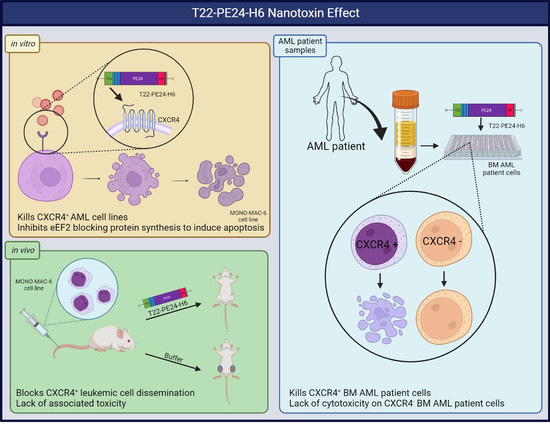Pharmaceutics 2023, 15(3), 727; https://doi.org/10.3390/pharmaceutics15030727
Abstract

Despite advances in the development of targeted therapies for acute myeloid leukemia (AML), most patients relapse. For that reason, it is still necessary to develop novel therapies that improve treatment effectiveness and overcome drug resistance. We developed T22-PE24-H6, a protein nanoparticle that contains the exotoxin A from the bacterium Pseudomonas aeruginosa and is able to specifically deliver this cytotoxic domain to CXCR4+ leukemic cells. Next, we evaluated the selective delivery and antitumor activity of T22-PE24-H6 in CXCR4+ AML cell lines and BM samples from AML patients. Moreover, we assessed the in vivo antitumor effect of this nanotoxin in a disseminated mouse model generated from CXCR4+ AML cells. T22-PE24-H6 showed a potent, CXCR4-dependent antineoplastic effect in vitro in the MONO-MAC-6 AML cell line. In addition, mice treated with nanotoxins in daily doses reduced the dissemination of CXCR4+ AML cells compared to buffer-treated mice, as shown by the significant decrease in BLI signaling. Furthermore, we did not observe any sign of toxicity or changes in mouse body weight, biochemical parameters, or histopathology in normal tissues. Finally, T22-PE24-H6 exhibited a significant inhibition of cell viability in CXCR4high AML patient samples but showed no activity in CXCR4low samples. These data strongly support the use of T22-PE24-H6 therapy to benefit high-CXCR4-expressing AML patients.
